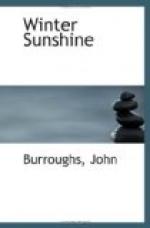I recently had the pleasure of a turn with some experienced hunters. As we ascended the ridge toward the mountain, keeping in our ears the uncertain baying of the hounds as they slowly unraveled an old trail, my companions pointed out to me the different run-ways,—a gap in the fence here, a rock just below the brow of the hill there, that tree yonder near the corner of the woods, or the end of that stone wall looking down the side-hill, or commanding a cow-path, or the outlet of a wood-road. A half-wild apple orchard near a cross-road was pointed out as an invariable run-way, where the fox turned toward the mountain again, after having been driven down the ridge. There appeared to be no reason why the foxes should habitually pass any particular point, yet the hunters told me that year after year they took about the same turns, each generation of foxes running through the upper corner of that field, or crossing the valley near yonder stone wall, when pursued by the dog. It seems the fox when he finds himself followed is perpetually tempted to turn in his course, to deflect from a right line, as a person would undoubtedly be under similar circumstances. If he is on this side of the ridge, when he hears the dog break around on his trail he speedily crosses to the other side; if he is in the fields, he takes again to the woods; if in the valley, he hastens to the high land, and evidently enjoys running along the ridge and listening to the dogs, slowly tracing out his course in the fields below. At such times he appears to have but one sense, hearing, and that seems to be reverted toward his pursuers. He is constantly pausing, looking back and listening, and will almost run over the hunter if he stands still, even though not at all concealed.
Animals of this class depend far less upon their sight than upon their hearing and sense of smell. Neither the fox nor the dog is capable of much discrimination with the eye; they seem to see things only in the mass; but with the nose they can analyze and define, and get at the most subtle shades of difference. The fox will not read a man from a stump or a rock, unless he gets his scent, and the dog does not know his master in a crowd until he has smelled him.
On the occasion to which I refer, it was not many minutes after the dogs entered the woods on the side of the mountain before they gave out sharp and eager, and we knew at once that the fox was started. We were then near a point that had been designated as a sure run-way, and hastened to get into position with all speed. For my part I was so taken with the music of the hounds, as it swelled up over the ridge, that I quite forgot the game. I saw one of my companions leveling his gun, and, looking a few rods to the right, saw the fox coming right on to us. I had barely time to note the silly and abashed expression that came over him as he saw us in his path, when he was cut down as by a flash of lightning. The rogue did not appear frightened, but ashamed and out of countenance, as one does when some trick has been played upon him, or when detected in some mischief.




